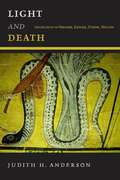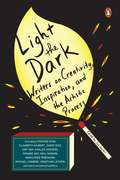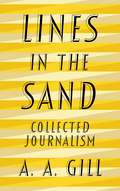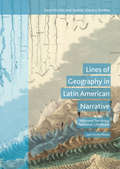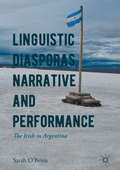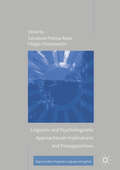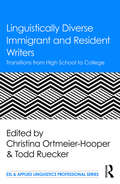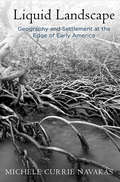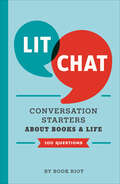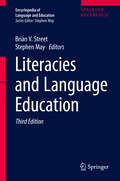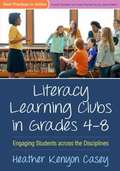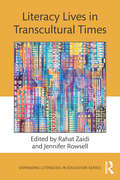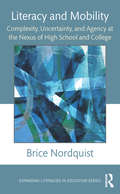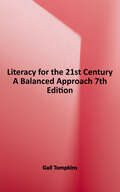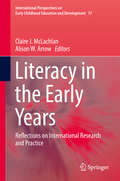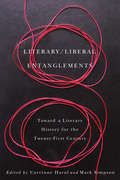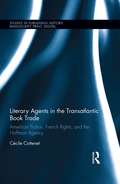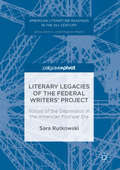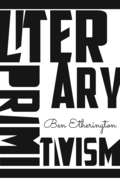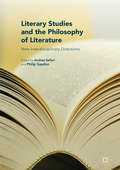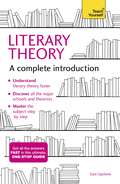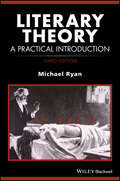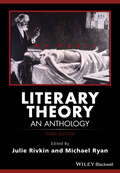- Table View
- List View
Light and Death: Figuration in Spenser, Kepler, Donne, Milton
by Judith H. AndersonLight figures being; darkness, death. Bridging mathematical science, semantics, rhetoric, grammar, and major poems, Judith H. Anderson seeks to negotiate writings from multiple disciplines in the shared terms of poiesis and figuration rather than as cultural opposites. Analogy, a type of metaphor, has always been the connector of the known to the unknown, the sensible to the infinite. Anderson’s study moves from the figuration of light and death to the history of analogy and its pertinence to light in physics and metaphysics, from Kepler to Donne, Spenser, and Milton. Topics proliferate: creativity, optics, the relation of literature to science, the methodology of thought and argument, and the processes of narrative, discovery, and interpretation.
Light the Dark: Writers on Creativity, Inspiration, and the Artistic Process
by Joe FasslerA stunning guide to finding creative inspiration and how it can illuminate your life, your work, and your art—from Stephen King, Junot Díaz, Elizabeth Gilbert, Amy Tan, Khaled Hosseini, Roxane Gay, Neil Gaiman, and many more acclaimed writers What inspires you? That's the simple, but profound question posed to forty-six renowned authors in LIGHT THE DARK. Each writer begins with a favorite passage from a novel, a song, a poem—something that gets them started and keeps them going with the creative work they love. From there, incredible lessons and stories of life-changing encounters with art emerge, like how sneaking books into his job as a night security guard helped Khaled Hosseini learn that nothing he creates will ever be truly finished. Or how a college reading assignment taught Junot Díaz that great art can be a healing conversation, and an unexpected poet led Elizabeth Gilbert to embrace an unyielding optimism, even in the face of darkness. LIGHT THE DARK collects the best of The Atlantic's much-acclaimed "By Heart" series edited by Joe Fassler and adds brand new pieces, each one paired with a striking illustration. Here is a guide to creative living and writing in the vein of Daily Rituals, Bird by Bird, and Big Magic for anyone who wants to learn how great writers find inspiration—and how to find some of your own. CONTRIBUTING AUTHORS: Elizabeth Gilbert, Junot Díaz, Marilynne Robinson, Jonathan Lethem, Michael Chabon, Aimee Bender, Mary Gaitskill, Stephen King, Neil Gaiman, Roxane Gay, Angela Flournoy, Jonathan Franzen, Yiyun Li, Leslie Jamison, Claire Messud, Edwidge Danticat, David Mitchell, Khaled Hosseini, Ayana Mathis, Kathryn Harrison, Azar Nafisi, Hanya Yanagihara, Jane Smiley, Nell Zink, Emma Donoghue, Jeff Tweedy, Eileen Myles, Maggie Shipstead, Sherman Alexie, Andre Dubus III, Billy Collins, Lev Grossman, Karl Ove Knausgaard, Charles Simic, Jim Shepard, T.C. Boyle, Tom Perrotta, Viet Than Nguyen, William Gibson, Mark Haddon, Ethan Canin, Jessie Ball, Jim Crace, and Walter Mosley."As [these authors] reveal what inspires them, they, in turn, inspire the reader, all while celebrating the beauty and purpose of art." -Booklist
Lines in the Sand: Collected Journalism
by Adrian Gill'By miles the most brilliant journalist of our age' Lynn Barber'A golden writer' Andrew MarrA. A. Gill was rightly hailed as one of the greatest journalists of our time. This selection of some of his recent pieces, which he made himself before his untimely death, spans the last five years from all corners of the world. It shows him at his most perceptive, brilliant and funny.His subjects range from the controversial - fur - to the heartfelt - a fantastic crystallisation of what it means to be European. He tackles life drawing, designs his own tweed, considers boyhood through the prism of the Museum of Childhood, and spends a day at Donald Trump's university. In his final two articles he wrote with characteristic wit and courage about his cancer diagnosis - 'the full English - and the limits of the NHS. But more than any other subject, a recurring theme emerges in the overwhelming story of our times: the refugee crisis. In the last few years A. A. Gill wrote with compassion and anger about the refugees' story, giving us both its human face and its appalling context. The resulting articles are journalism at its finest and fiercest.
Lines of Geography in Latin American Narrative
by Aarti Smith MadanThis book looks to the writings of prolific statesmen like D. F. Sarmiento, Estanislao Zeballos, and Euclides da Cunha to unearth the literary and political roots of the discipline of geography in nineteenth-century Latin America. Tracing the simultaneous rise of text-writing, map-making, and institution-building, it offers new insight into how nations consolidated their territories. Beginning with the titanic figures of Strabo and Humboldt, it rereads foundational works like Facundo and Os sert#65533;es as examples of a recognizably geographical discourse. The book digs into lesser-studied bulletins, correspondence, and essays to tell the story of how three statesmen became literary stars while spearheading Latin America's first geographic institutes, which sought to delineate the newly independent states. Through a fresh pairing of literary analysis and institutional history, it reveals that words and maps--literature and geography--marched in lockstep to shape national territories, identities, and narratives.
Linguistic Diasporas, Narrative and Performance: The Irish in Argentina
by Sarah O'BrienThis book explores the present-day Irish Diaspora in Argentina, using oral narrative and a sociolinguistic theoretical framework to draw out the features that define contemporary Hiberno-Argentine identity. The author analyzes the spoken memories and discourses of Irish-Argentine descendants to trace the socio-political evolution of a bilingual, bicultural community from World War II to the present day. In so doing, O’Brien reveals a legacy of emigration that is without precedent in the global Irish Diaspora, and which is deeply relevant to today’s global Irish citizenry in its challenging of preconceived notions of what it is to be Irish in the New World. As well as contributing to understandings of an immigrant linguistic journey over three generations, the book also provides a vital ethnographic portrait of an Irish descendant community that is acutely aware of its vulnerability and invisibility in an increasingly pluralistic South American society. This book will appeal to an interdisciplinary audience including scholars of migration, oral history, folklore, bilingualism, memory, sociolinguistics, narrative performance and Irish Diaspora studies.
Linguistic and Psycholinguistic Approaches on Implicatures and Presuppositions
by Filippo Domaneschi Salvatore Pistoia-RedaThis book discusses developments in the study of implicatures and presuppositions, drawing on recent linguistic and psycholinguistic literature. It provides original discussions of specific formal aspects of the theoretical reconstruction of these phenomena. The authors offer innovative experimental analyses in which crucial processing questions are addressed, and new experimental methodologies are introduced. The result is an advanced debate featuring broad empirical coverage of the issues, as well as an informed discussion of the connections between a Compositional Semantics and a Pragmatic Theory of Implicit Communication, in light of the empirical data coming from Experimental Semantics and Pragmatics. This book will be a worthwhile read for those with interests in both the formal and methodological aspects of these arguments.
Linguistically Diverse Immigrant and Resident Writers: Transitions from High School to College (ESL & Applied Linguistics Professional Series)
by Todd Ruecker Christina Ortmeier-HooperSpotlighting the challenges and realities faced by linguistically diverse immigrant and resident students in U.S. secondary schools and in their transitions from high school to community colleges and universities, this book looks at programs, interventions, and other factors that help or hinder them as they make this move. Chapters from teachers and scholars working in a variety of contexts build rich understandings of how high school literacy contexts, policies such as the proposed DREAM Act and the Common Core State Standards, bridge programs like Upward Bound, and curricula redesign in first-year college composition courses designed to recognize increasing linguistic diversity of student populations, affect the success of this growing population of students as they move from high school into higher education.
Liquid Landscape: Geography and Settlement at the Edge of Early America (Early American Studies)
by Michele Currie NavakasIn Florida, land and water frequently change places with little warning, dissolving homes and communities along with the very concepts of boundaries themselves. While Florida's landscape of saturated swamps, shifting shorelines, coral reefs, and tiny keys initially impeded familiar strategies of early U.S. settlement, such as the establishment of fixed dwellings, sturdy fences, and cultivated fields, over the course of the eighteenth and nineteenth centuries, Americans learned to inhabit Florida's liquid landscape in unconventional but no less transformative ways.In Liquid Landscape, Michele Currie Navakas analyzes the history of Florida's incorporation alongside the development of new ideas of personhood, possession, and political identity within American letters. From early American novels, travel accounts, and geography textbooks, to settlers' guides, maps, natural histories, and land surveys, early American culture turned repeatedly to Florida's shifting lands and waters, as well as to its itinerant enclaves of Native Americans, Spaniards, pirates, and runaway slaves.This preoccupation with Floridian terrain and populations, argues Navakas, reveals a deep American concern with the challenges of settling a region so exceptional in topography, geography, and demography. Navakas reads a vast archive of popular, literary, and reference texts spanning Revolution to Reconstruction, including works by William Bartram, James Fenimore Cooper, and Harriet Beecher Stowe, to uncover an alternative history of American possession, one that did not descend exclusively, or even primarily, from the more familiar legal, political, and philosophical conceptions of American land as enduring, solid, and divisible. The shifting southern edge of early America produced a new language of settlement, belonging, territory, and sovereignty, and that language would ultimately transform how people all across the rapidly changing continent imagined the making of U.S. nation and empire.
Lit Chat: Conversation Starters about Books and Life (100 Questions)
by Book RiotGet the conversation started—at your book club, writer&’s group, or any friendly get-together—with these 100 reading-themed questions. Some invoke books that are tied to memories (name your favorite childhood picture book); others prompt you to choose ideal reading material for a hypothetical situation (if you were stranded on a desert island, what book would you want with you?). Some of them aim to get people comparing their favorite (and not-so-favorite) characters or authors, and others engage in popular debates among readers (name a movie adaptation you liked and defend your choice). Created to give readers of all persuasions an excuse to talk about books, ideas, and life itself, this collection from the largest independent community for book lovers in North America is a delight for any bibliophile. Reading is a solitary experience—but being a reader is a shared experience, and that shared experience is what Lit Chat is all about.
Literacies and Language Education: Social Literacies: Critical Approaches To Literacy In Development, Ethnography And Education (Encyclopedia of Language and Education)
by Brian V. Street Stephen MayIn this third, fully revised edition, the 10 volume Encyclopedia of Language and Education offers the newest developments, including an entirely new volume of research and scholarly content, essential to the field of language teaching and learning in the age of globalization. In the selection of topics and contributors, the Encyclopedia reflects the depth of disciplinary knowledge, breadth of interdisciplinary perspective, and diversity of socio-geographic experience in the language and education field. Throughout, there is an inclusion of contributions from non-English speaking and non-western parts of the world, providing truly global coverage. Furthermore, the authors have sought to integrate these voices fully into the whole, rather than as special cases or international perspectives in separate sections. The Encyclopedia is a necessary reference set for every university and college library in the world that serves a faculty or school of education, as well as being highly relevant to the fields of applied and socio-linguistics. The publication of this work charts the further deepening and broadening of the field of language and education since the publication of the first edition of the Encyclopedia in 1997 and the second edition in 2008.
Literacy Learning Clubs in Grades 4-8: Engaging Students across the Disciplines
by Heather Kenyon CaseyLiteracy learning clubs are highly motivating small-group collaborations that can improve tweens' and teens' academic achievement, support their social-emotional development, and increase their enjoyment of reading and writing. This book explains the research basis for the author's approach and offers practical instructions for implementation in English language arts, social studies, science, and mathematics classrooms, illustrated with detailed case examples. Links to the Common Core State Standards are identified, and multimodal methods and new literacies emphasized throughout. User-friendly features include end-of-chapter reflection questions and suggested activities. The Appendix provides reproducible planning forms and handouts that can be downloaded and printed in a convenient 8 1/2" x 11" size.
Literacy Lives in Transcultural Times (Expanding Literacies in Education)
by Jennifer Rowsell Rahat ZaidiCombining language research with digital, multimodal, and critical literacy, this book uniquely positions issues of transcultural spaces and cosmopolitan identities across an array of contexts. Studies of everyday diasporic practices across places, spaces, and people’s stories provide authentic pictures of people living in and with diversity. Its distinctive contribution is a framework to relate observation and analysis of these flows to language development, communication, and meaning making. Each chapter invites readers to reflect on the dynamism and complexity of spaces and contexts in an age of increasing mobility, political upheaval, economic instabilities, and online/offline landscapes.
Literacy and Mobility: Complexity, Uncertainty, and Agency at the Nexus of High School and College
by Brice NordquistPushing forward research on emerging literacies and theoretical orientations, this book follows students from different tracks of high school English in a "failing" U.S. public school through their first two years in universities, colleges, and jobs. Analytical and methodological tools from new literacy and mobility studies are employed to investigate relations among patterns of movement and literacy practices across educational institutions, neighborhoods, cultures, and national borders. By following research participants’ trajectories in and across scenes of literacy in school, college, home, online, in transit, and elsewhere, the work illustrates how students help constitute and connect one scene of literacy with others in their daily lives; how their mobile literacies produce, maintain, and disrupt social relations and identities with respect to race, gender, class, language, and nationality; and how they draw upon multiple literacies and linguistic resources to accommodate, resist, and transform dominant discourses.
Literacy for the 21st Century: A Balanced Approach, Seventh Edition
by Gail TompkinsTeaching literacy with a balance of theory and applications. Integrating the best of what we currently know about teaching reading and writing, as well as ideas that will lead us into the future, Literacy for the 21st Century: A Balanced Approach provides the balance of pedagogy and application that teachers need to be successful in the classroom. It covers the fundamental components of literacy, illustrates how to teach skills and strategies, identifies how to differentiate instruction to meet the diverse needs of students today, and supports digital teaching and learning. An emphasis is placed on preparing readers to become teachers who will ensure their students meet grade-level standards. The Seventh Edition provides the theoretical background and most contemporary and practical approaches for literacy instruction–everything readers need to create a classroom climate that allows all students to flourish.
Literacy in the Early Years
by Claire J. Mclachlan Alison W. ArrowThis edited collection provides an in-depth exploration of different aspects of contemporary early childhood literacy research and the implications for educational practice. Each chapter details how the research was conducted and any issues that researchers encountered in collecting data with very young children, as well as what the research findings mean for educational practice. It includes photographs of effective literacy practice, detailed explanations of research methods so the studies can be replicated or expanded upon, and key features for promoting effective literacy practice in early childhood settings. This book is an essential read for everyone who is interested in exploring the complexities and challenges of researching literacy acquisition in the youngest children.
Literary / Liberal Entanglements: Toward a Literary History for the Twenty-First Century
by Corrinne Harol Mark SimpsonIn Literary/Liberal Entanglements, Corrinne Harol and Mark Simpson bring together ten essays by scholars from a wide range of fields in English studies in order to interrogate the complex, entangled relationship between the history of literature and the history of liberalism. The volume has three goals: to investigate important episodes in the entanglement of literary history and liberalism; to analyze the impact of this entanglement on the secular and democratic projects of modernity; and thereby to reassess the dynamics of our neoliberal present. The volume is organized into a series of paired essays, with each pair investigating a concept central to both literature and liberalism: acting, socializing, discriminating, recounting, and culturing. Collectively, the essays demonstrate the vivid capacity of literary study writ large to reckon with, imagine, and materialize durative accounts of history and politics. Literary/Liberal Entanglements models a method of literary history for the twenty-first century.
Literary Agents in the Transatlantic Book Trade: American Fiction, French Rights, and the Hoffman Agency (Studies in Publishing History: Manuscript, Print, Digital)
by Cécile CottenetBy way of a case study of one of the oldest French book agencies, Agence Hoffman, this book analyzes the role played by French literary agents in the importation of US fiction and literature into France in the years following World War II. It sheds light on the material conditions of the circulation of texts across the Atlantic between 1944 and 1955, exploring the fine mechanisms of agents’ negotiations which allowed texts, and ideas, to cross borders. While providing comparative insights into the history of publishing in France and in the United States in the immediate aftermath of the war, this book aims at foregrounding the role of the book agent, an all-too often neglected intermediary in the field of book history. Grounded in archival work conducted both in France and the United States, this study is based on previously unexamined correspondence. Considering the concept of mediation as central in the field of print culture, this book addresses the dearth of scholarship on literary agents on both sides of the Atlantic, and intersects with the current scholarship on transatlantic, internationalm and transnational cultural and trade networks, as evidenced by the recently emerged field of sociology of translation in Europe.
Literary Criticism: A Concise Political History
by Joseph NorthSince the global turn to neoliberalism in the 1970s, movements in literary studies have been diagnostic rather than interventionist: scholars have developed techniques for analyzing culture but have retreated from attempts to transform it. For Joseph North, a genuinely interventionist criticism is a central task facing scholars on the Left today.
Literary Legacies of the Federal Writers’ Project
by Sara RutkowskiThe first book-length literary analysis of the WPA's Federal Writers' Project (FWP)--a massive New Deal program that put thousands to work documenting the country during the Depression. Drawing on critical histories, archival documents, and select works of fiction, the book examines the nature and history of the FWP's documentary method and its literary imprint, particularly on three key black American writers: Ralph Ellison, Dorothy West, and Margaret Walker. By aiming their documentary lenses so precisely on individual voices, folklore, and cultural communities, FWP writers would ultimately eschew the social realism of thirties culture in favor of themes surrounding personal and cultural identities in the postwar era. This concise volume demonstrates how the FWP served as a repository from which many of the most treasured 20th century writers drew material, techniques, and philosophical direction in ways that would help steer the course of American writing.
Literary Primitivism
by Ben EtheringtonThis book fundamentally rethinks a pervasive and controversial concept in literary criticism and the history of ideas. Primitivism has long been accepted as a transhistorical tendency of the "civilized" to idealize that primitive condition against which they define themselves. In the modern era, this has been a matter of the "West" projecting its primitivist fantasies onto non-Western "others." Arguing instead that primitivism was an aesthetic mode produced in reaction to the apotheosis of European imperialism, and that the most intensively primitivist literary works were produced by imperialism's colonized subjects, the book overturns basic assumptions of the last two generations of literary scholarship. Against the grain, Ben Etherington contends that primitivism was an important, if vexed, utopian project rather than a form of racist discourse, a mode that emerged only when modern capitalism was at the point of subsuming all human communities into itself. The primitivist project was an attempt, through art, to recreate a "primitive" condition then perceived to be at its vanishing point. The first overview of this vast topic in forty years, Literary Primitivism maps out previous scholarly paradigms, provides a succinct and readable account of its own methodology, and presents critical readings of key writers, including Aimé Césaire, Frantz Fanon, D. H. Lawrence, and Claude McKay.
Literary Studies and the Philosophy of Literature
by Andrea Selleri Philip GaydonThis book is about the interaction between literary studies and the philosophy of literature. It features essays from internationally renowned and emerging philosophers and literary scholars, challenging readers to join them in taking seriously the notion of interdisciplinary study and forging forward in new and exciting directions of thought. It identifies that literary studies and the philosophy of literature address similar issues: What is literature? What is its value? Why do I care about characters? What is the role of the author in understanding a literary work? What is fiction as opposed to non-fiction? Yet, genuine, interdisciplinary interaction remains scarce. This collection seeks to overcome current obstacles and seek out new paths for exploration.
Literary Theory: A Complete Introduction
by Sara UpstoneLiterary theory has now become integral to how we produce literary criticism. When critics write about a text, they no longer think just about the biographical or historical contexts of the work, but also about the different approaches that literary theory offers. By making use of these, they create new interpretations of the text that would not otherwise be possible. In your own reading and writing, literary theory fosters new avenues into the text. It allows you to make informed comments about the language and form of literature, but also about the core themes - concepts such as gender, sexuality, the self, race, and class - which a text might explore.Literary theory gives you an almost limitless number of texts to work into your own response, ensuring that your interpretation is truly original. This is why, although literary theory can initially appear alienating and difficult, it is something to get really excited about. Imagine you are standing in the centre of a circular room, with a whole set of doors laid out around you. Each doorway opens on to a new and illuminating field of knowledge that can change how you think about what you have read: perhaps in just a small way, but also perhaps dramatically and irrevocably. You can open one door, or many of them. The choice is yours. Put the knowledge you gain together with your own interpretation, however, and you have a unique and potentially fascinating response. Each chapter in Literary Theory: A Complete Introduction covers a key school of thought, progressing to a point at which you'll have a full understanding of the range of responses and approaches available for textual interpretation. As well as focusing on such core areas as Marxism, Modernism, Postmodernism, Structuralism and Poststructuralism, this introduction brings in recent developments such as Eco and Ethical Criticism and Humanisms.
Literary Theory: A Complete Introduction
by Sara UpstoneLiterary theory has now become integral to how we produce literary criticism. When critics write about a text, they no longer think just about the biographical or historical contexts of the work, but also about the different approaches that literary theory offers. By making use of these, they create new interpretations of the text that would not otherwise be possible. In your own reading and writing, literary theory fosters new avenues into the text. It allows you to make informed comments about the language and form of literature, but also about the core themes - concepts such as gender, sexuality, the self, race, and class - which a text might explore.Literary theory gives you an almost limitless number of texts to work into your own response, ensuring that your interpretation is truly original. This is why, although literary theory can initially appear alienating and difficult, it is something to get really excited about. Imagine you are standing in the centre of a circular room, with a whole set of doors laid out around you. Each doorway opens on to a new and illuminating field of knowledge that can change how you think about what you have read: perhaps in just a small way, but also perhaps dramatically and irrevocably. You can open one door, or many of them. The choice is yours. Put the knowledge you gain together with your own interpretation, however, and you have a unique and potentially fascinating response. Each chapter in Literary Theory: A Complete Introduction covers a key school of thought, progressing to a point at which you'll have a full understanding of the range of responses and approaches available for textual interpretation. As well as focusing on such core areas as Marxism, Modernism, Postmodernism, Structuralism and Poststructuralism, this introduction brings in recent developments such as Eco and Ethical Criticism and Humanisms.
Literary Theory: A Practical Introduction (How to Study Literature)
by Michael RyanLiterary Theory: A Practical Introduction, Third Edition, presents a comprehensive introduction to thefull range of contemporary approaches to the study of literature and culture, from formalism, structuralism, and historicism to ethnic, gender, and science studies.Introduces students to a variety of contemporary approaches to the study of literature and cultureDemonstrates how the varying perspectives on texts can lead to different interpretations of the same workFeatures numerous updates that include new literary texts, new and expanded sectionsRepresents the ideal accompaniment to the upcoming Third Edition of LiteraryTheory: An Anthology
Literary Theory: An Anthology (Blackwell Anthologies #3)
by Michael Ryan Julie RivkinThe new edition of this bestselling literary theory anthology has been thoroughly updated to include influential texts from innovative new areas, including disability studies, eco-criticism, and ethics. Covers all the major schools and methods that make up the dynamic field of literary theory, from Formalism to Postcolonialism Expanded to include work from Stuart Hall, Sara Ahmed, and Lauren Berlant. Pedagogically enhanced with detailed editorial introductions and a comprehensive glossary of terms
